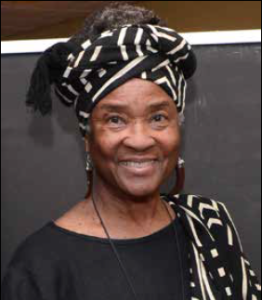J.E. FRANKLIN
Biography
Jennie Elizabeth Franklin was born in Houston, Texas. She began writing her impressions as a child and received a BA from the University of Texas. In 1964, while working with CORE in Mississippi, she engaged in an effort designed to interest students in reading. Her techniques led to her playwriting career and her first full-length play, A First Step to Freedom (1964), which was performed in Harmony, Mississippi at Sharon Waite Community Center. Other produced plays include Prodigal Daughter, a street theater project performed at Lincoln Center and on a Bronx street corner; The In-Crowd (1965), performed at the Montreal Expo in 1967; Mau Mau Room, performed by the Negro Ensemble Company Workshop; Two Flowers, produced at the New Feminist Theatre; and The Prodigal Sister, produced at Theatre de Lys (1974).
However, it was the play Black Girl (1971) that earned her acclaim and a following. The play later became a movie with Ossie Davis as director and Franklin as screenwriter. Initially, the play was produced by Woodie King, Jr. at the New Federal Theatre and later moved to the Theatre de Lys. In addition to her produced plays, Franklin has many unpublished and unproduced works. She has contributed articles to periodicals and written a book entitled Black Girl, from Genesis to Revelations (1977), which details the writing of the play, her confrontation with the theater world, and the pains and promises of converting the play into a television production and later a film. In her works, she is realistic, presents multifaceted African-American life from a female perspective, and demonstrates her belief that the theater should educate, be socially aware, and present feelings and options to the viewers. (Full Bio)
Plays
Black Girl (1971)
Trapped in a life that can lead nowhere, Billie Jean has dropped out of school and secretly taken a job as a dancer in a local bar, her ultimate goal being to become a ballet dancer. But her ambitions bring her into conflict with her envious sisters, both of whom have been locked into dreary marriages too early, and her mother, who has given up on her own children and now lavishes her care and affection on her “foster daughters” —industrious girls to whom she has transferred her own frustrated hopes. Billie Jean must fight a multiplicity of prejudices—family, sex, color, class, and economics—to win an education and forge her own identity. But with her grandmother’s strength and trust to embolden her, Billie Jean breaks free, establishing at last a tenuous but hopeful relationship with her mother and taking the first sure steps toward a life that will, at least, be of her own making. (Source)
Cast Requirement: 10 (7f, 3m)
Characters: Norma, Earl, Little Earl, Mu’Dear, Ruth Ann, Mr. Herbert, Billie Jean, Sheryl, Netta, Mama Rosie
Publication: Black Girl: A Play in Two Acts. Dramatists Play Service, 1971. (Link)
+ More info
Black Girl was originally produced by the New Federal Theatre at the Lucille Lortel Theatre (then called the Theatre de Lys) in 1971. This production was directed by Shauneille Perry; the set design was by Charles Mills; the costume design was by Femi; the lighting design was by Buddy; the sound design was by Gary Harris; the production stage manager was Horacena J. Taylor. The cast for this production included:
- Norma - Gloria Edwards
- Earl - Arthur French
- Little Earl - Arthur W. French III
- Mu’Dear - Minnie Gentry
- Ruth Ann - Loretta Greene
- Mr. Herbert - Jimmy Hayeson
- Billie Jean - Kishasha
- Sheryl - Lorraine Ryder
- Netta - Saundra P. Sharp
- Mama Rosie - Louise Stubbs
The Prodigal Sister (1974)
In this updated, musical version of The Prodigal Son, Jackie is a pregnant, high-school, African-American girl from a backwater town who takes off for Baltimore to escape her parents' wrath. There she takes up with street people and winds up working in a coffin factory which is a front for drug dealers and prostitutes. But when trouble in her new life finally sends Jackie back home, all turns out well and all is forgiven. (Source)
Cast Requirement: 15 (5f, 4m, 5any)
Characters: Sissie, Prostitutes, Employment Girls, Dowahs, Country Girls, Policemen, Country Boys, City Men, Mrs. Johnson, Reverend Wynn, Employment Man, Jackie, Jack, Slick, Pallbearer, Lucille, Mother, Essie, Baltimore Bessie, Dr. Patten, Caesar, Jackie’s Boyfriend
Publication: The Prodigal Sister: A New Black Musical. Samuel French, 1975. (Link)
+ More info
The Prodigal Sister was first produced by the New Federal Theatre at the Lucille Lortel Theatre (then called the Teatre de Lys) in New York in 1974. The production was directed by Shauneille Perry; the composer was Micki Grant who also contributed some lyrics; the musical director was Neal Tate; the choreographer was Rod Rodgers; the production designer was C. Richard Mills; the costume designer was Judy Dearing; the production stage manager was Dan Early. The cast for this production included:
- Mrs. Johnson - Esther Brown
- Reverend Wynn, Employment Man - Frank Carey
- Jackie - Paula Desmond
- Jack - Leonard Jackson
- Slick, Pallbearer - Kirk Kirksey
- Lucille - Saundra McClain
- Mother - Frances Salisbury
- Essie, Baltimore Bessie - Louise Stubbs
- Dr. Patten, Caesar, Jackie’s Boyfriend - Victor Willis
- Sissie, Prostitute, Employment Girl, Dowah, Country Girl, Policeman, Country Boy, City Man - Ethel Beatty
- Prostitute, Employment Girl, Dowah, Country Girl, Policeman, Country Boy, City Man - Judy Dearing
- Prostitute, Employment Girl, Dowah, Country Girl, Policeman, Country Boy, City Man - Yolande Graves Prostitute, Employment Girl, Dowah, Country Girl, Policeman, Country Boy, City Man - Rael Lamb Prostitute, Employment Girl, Dowah, Country Girl, Policeman, Country Boy, City Man - Larry Lowe Hot Pants Harriet, Prostitute, Employment Girl, Dowah, Country Girl, Policeman, Country Boy, City Man - Joyce Griffen
Resources
Other work by franklin
“Two Mens’es Daughters,” a short play in The Best Plays American Short Plays 1994-1995. Applause Books. 1995. (Link)
J.E. Franklin Plays, [1971?]-1978, archival collection. (Link)
J.E. Franklin Plays, 1988-1990, archival collection. (Link)
Novels:
Black Girl, from Genesis to Revelations. 1977. (Link)
Interviews:
J.E. Franklin interview in Hatch-Billops Collection of the Schomburg Center (audio recording). (Link)
Articles:
“J.E. Franklin.” Black World, April 1972. (Link)
“Playwright in Harlem”. Uptown Vol 1(2), 1979. (Link)
Playwright, black woman, wrote play “Black Girl” now playing in Greenwich Village. Black Creation. Fall 1971. (Link)

